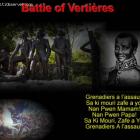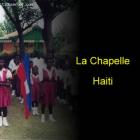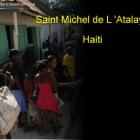ADVERTISEMENT
Disability - Haiti Observer Blog
Disability, Haiti Observer Blog. Read the following articles about Disability
Participation Of People With Disabilities & Special Needs In Haiti Election
Ketizia Brunard, the Secretary of the National Associative Network for the Integration of Persons with Disabilities, during a training program jointly organized by BRIDGE (Building Resources in Democracy, Governance and Elections), the United Nations Development Programme (UNDP) and the International Foundation for Election Systems (IFES), has encouraged the authority to take census of the people with less mobility and people with special needs and give them opportunity to participate in the forthcoming election process. To facilitate their exercising rights for casting votes, the administration can experiment with electronic voting, or voting through mobile phone or set up special offices for them.
BRIDGE offers training programs to support the election process implemented by the UNDP with fundings from the Haitian government and some other foreign countries like Canada, Brazil, the EU, the USA and Mexico. A report from the World Health Organization confirms that before the 2010 earthquake, there were nearly 800,000 people with disability in Haiti of whom 200,000 were children. The disaster added 300,000 more injured, many of whom were suffered with long term disabilities.
Haitian Amputee to offer Soccer demonstration at K of C soccer field in Vatican, Rome
Following the earthquake which occurred five years ago in which many children lost various appendages, the program 'Healing Haiti's Children' was eager to fulfill their mandate of providing each child who had lost a limb during the earthquake with a prosthetic replacement. The program was made possible by the sponsorship of the Knights of Columbus along with Project Medishare, an affiliate of the University of Miami. Now three of those children, young men who had each lost one leg as a result of that January day, are giving back what they can, first by playing a demonstrative game of football at the Vatican.
Nearly 80,000 people are blind in Haiti, 1% of the population
By the definitions of WHO, the World Health Organization, 1% of the population of Haiti is classified as blind. For children who are visually impaired, progress through life can be especially challenging, sometimes, even more so than others with more physical impairments.
This sentiment is that of Dr. Michael A. Pean from SHAA, the Haitian Society for Aid to the Blind.
One of the greatest handicaps meted out to a visually impaired child is the lack of access to education and the need for particular instruments to aid their learning. A child must be completely proficient and skilled at Braille, the writing technique that utilizes a blind person's sense of touch, before they can matriculate into the regular school system. This skill, if acquired late, can be the reason why a blind child enters school early, late, or just on time in life.
Disabled Haitians receiving more Acceptance at Public Events
Haiti is catching up with the rest of the world in giving attention to the needs and rights of disabled persons. At 2014 Carnival, 40 disabled people participated in the parade. The first contingent in the parade, right behind the National Palace band, they were the center of attention, wearing t-shirts emblazoned with slogans, meant to trumpet their equality and inclusiveness among all citizens of Haiti.
The achievement of being able to march in one of Haiti's most well-attended events of the year was due to Gerald Oriol Jr., Secretary of State for the State Office for the Integration of Persons with Disabilities. Oriol himself is disabled, afflicted with muscular dystrophy since birth and consigned to a wheelchair as a young boy. Oriol says no official count of how many people in Haiti are living with disabilities has been done, but rough estimates put the figure at 800,000-1,000,000.
Roger Dorsinville Sound Library an Education Tool for Visually Impaired
Knowledge and Freedom Foundation and Haitian Blind Aid Society (AAHS) have joined forces to create a library for visually impaired Haitians, an underserved population in Haiti. The European Union (EU) has provided much of the funding in partnership with Libraries Without Borders (BSF).
The sound library, named because all works are recorded on audio tapes by volunteer readers, follows a format based on a Canadian model. The books have been recorded in both Créole and French by students and artists. The material chosen is suited to the age and interests of the readers. The readers have shown a spirited interest in the project, signing up to be volunteers.
Western Union to enable Haitians to access government payments
The Haitian government has announced that, through the Western Union, the issuing of badly needed government payments, used to meet the needs of the poor through programs for schools and universities, the handicapped and over 200,000 people, will finally be more readily accessible to those in the dreaded 'last mile'.
At first, the service will make funds available to the needy through their more than 600 locations across the country. They also will give technical assistance to assist with payment delivery and plan to offer other options for distributing funds through bank accounts, prepaid cards and mobiles.
Our objective is to share with you news and information about Haiti and the people of Haiti. Traditions, habits and the way we were or grew are alive in this site. We highly recommend that you Subscribe to our Newsletter and also share with us some of the things that are memorable and made us unique people.

 Battle of Vertieres
Battle of Vertieres  Newsletter
Newsletter  La Chapelle, Haiti
La Chapelle, Haiti  Saint Michel de L 'Atalaye
Saint Michel de L 'Atalaye  Haitian Thanksgiving
Haitian Thanksgiving